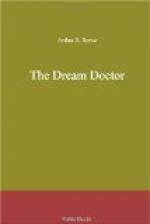“Well protected by lightning-rods,” remarked Kennedy, as he looked the Stamford cottage over narrowly. “We might as well drive on. Keep an eye on the hotel, Burke. It may be that Nordheim intends to return, after all.”
“Assuming that he has left,” returned the secret-service man.
“But you said he had left,” said Kennedy. “What do you mean?”
“I hardly know myself,” wearily remarked Burke, on whom the strain of the case, to which we were still fresh, had begun to tell. “I only know that I called up Washington after I heard he had been at the hotel, and no one at our headquarters knew that he had returned. They may have fallen down, but they were to watch both his rooms and the embassy.”
“H-m,” mused Kennedy. “Why didn’t you say that before?”
“Why, I assumed that he had gone back, until you told me there was interference to-night, too. Now, until I can locate him definitely I’m all at sea—that’s all.”
It was now getting late in the evening, but Kennedy had evidently no intention of returning yet to Lookout Hill. We paused at the hotel, which was in the centre of the cottage colony, and flanked by a hill that ran back of the colony diagonally and from which a view of both the hotel and the cottages could be obtained. Burke’s inquiries developed the fact that Nordheim had left very hurriedly and in some agitation. “To tell you the truth,” confided the clerk, with whom Burke had ingratiated himself, “I thought he acted like a man who was watched.”
Late as it was, Kennedy insisted on motoring to the railroad station and catching the last train to New York. As there seemed to be nothing that I could do at Lookout Hill, I accompanied him on the long and tedious ride, which brought us back to the city in the early hours of the morning.
We stopped just long enough to run up to the laboratory and to secure a couple of little instruments which looked very much like small incandescent lamps in a box. Then, by the earliest train from New York, we returned to Lookout Hill, with only such sleep as Kennedy had predicted, snatched in the day coaches of the trains and during a brief wait in the station.
A half-hour’s freshening up with a dip in the biting cold water of the bay, breakfast with Captain Shirley and Miss Gladys, and a return to the excitement of the case, had to serve in place of rest. Burke disappeared, after a hasty conference with Kennedy, presumably to watch Mrs. Brainard, the hotel, and the Stamford cottage to see who went in and out.
“I’ve had the Z99 brought out of its shed,” remarked the captain, as we rose from the breakfast-table. “There was nothing wrong as far as I could discover last night or by a more careful inspection this morning. I’d like to have you take a look at her now, in the daylight.”
“I was about to suggest,” remarked Kennedy, as we descended the steps to the shore, “that perhaps, first, it might be well to take a short run in her with the crew, just to make sure that there is nothing wrong with the machinery.”




